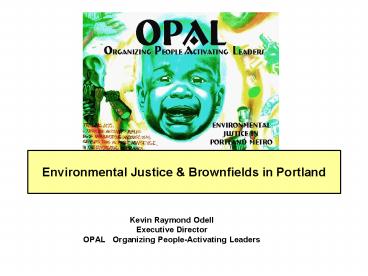Environmental Justice - PowerPoint PPT Presentation
1 / 12
Title:
Environmental Justice
Description:
Environmental Justice Issues-- Why are Brownfields part of EJ? OPAL Concerns ... Other Issues: Land-Use and Zoning, Lack of Voice, Political Will and Access, ... – PowerPoint PPT presentation
Number of Views:38
Avg rating:3.0/5.0
Title: Environmental Justice
1
Environmental Justice Brownfields in Portland
- Kevin Raymond Odell
- Executive Director
- OPAL Organizing People-Activating Leaders
2
Background
- What is Environmental Justice?
- Environmental Justice Issues--
- Why are Brownfields part of EJ?
- OPAL Concerns
3
What is Environmental Justice (EJ)?
- Environmental Justice is the right to a decent,
safe quality of life for people of all races,
incomes and cultures in the environments where we
live, work, play, learn and pray. Environmental
Justice emphasizes accountability, democratic
practices, equitable treatment and
self-determination
4
National and Local EJ issues
- NATIONAL EJ
- Love Canal (1977)
- Warren County, NC (1981)
- Hurricane Katrina (2005)
- LOCAL EJ
- Vanport Flood (1949)
- 1-5 and 1-205 Hwy (1983-1985)
- Portland Harbor (2002-)
5
EJ In Oregon
- Issues and Concerns
- Health Issues Asthma, Lead-Poisoning, Toxic
Exposure, Contaminated Fish Consumption,
Substandard Housing, Blighted Communities,
Highway Bifurcation, Mold, Resource Availability. - Other Issues Land-Use and Zoning, Lack of Voice,
Political Will and Access, Cultural Competence.
6
What are Brownfields?
- Brownfields" are used lands where
expansion or redevelopment is complicated by real
or perceived environmental contamination. - The term brownfields was created to illustrate
an unintended side-effect of federal and state
cleanup laws liability and severe costs of
cleanups imposed by these laws cause these
properties to be abandoned in favor of developing
unused land or greenfields.
7
Why are Brownfields part of EJ?
- Blighted Communities
- Small vs. Large
- Access to Resource and Decision-Making
- New Brownfields Meth Houses, etc.
8
Concerns around Brownfield Redevelopment and
Urban Renewal
The Community Renters, Low-Income Property
Owners, Schools, Churches Small Businesses,
Senior Citizens, Immigrants, Affordable Housing
Tenants
9
Who Makes Decisions ?
The Community
10
OPAL TIF REFORM
- Tax increment financing should be used only if
- the investment serves a public purpose, (b) a
legitimate finding of blight can be made, and (c)
subsequent private redevelopment would not
reasonably be expected to happen, but for the
public investment. - There should be a showing that a TIF in a
blighted area will benefit the residents of that
area. - TIFs should not be used to finance gentrification
of a neighborhood that forces local residents to
move or forces rents up beyond affordability to
current residents. - TIFs should spellout how that benefit will occur
in such areas as improved housing quality and
affordability,improved economic activity and
employment opportunity, and improved access to
quality and affordable services. - Any TIF project that will displace residents
should be put to a referendum, regardless of
thenature of the public investment, and the
project should be required to provide replacement
housing for such displaced residents of a kind
and location satisfactory to those residents. - Existing residents and businesses should be
involved from the beginning in the planning
process for redevelopment of any TIF area.
11
Who is OPAL?
OPAL is a community organization formed
in 2005 that works for Environmental Justice in
the Portland metro area. We support ignored
communities that fight against the oppression of
pollution and social injustice.
www.opalpdx.org
- OPAL brings together and helps educate residents
and groups around EJ issues such as the right to
breath clean air, drink clean water, and live in
safe and healthy neighborhoods. - OPAL focuses on the ignored communities of Outer
SE Portland and Lents, an ethnically diverse
region of Portland where the average household
income is 25 lower than the rest of the city.
12
OPAL Concerns
- Brownfields Redevelopment for Who?
- Government Accountability
- Elected Leadership
- COMMUNITY PARTICIPATION!!!

























![[PDF]❤️DOWNLOAD⚡️ On the Swamp: Fighting for Indigenous Environmental Justice PowerPoint PPT Presentation](https://s3.amazonaws.com/images.powershow.com/10044909.th0.jpg?_=20240601043)
![❤[PDF]⚡ Race and the Greening of Atlanta: Inequality, Democracy, and Environmental PowerPoint PPT Presentation](https://s3.amazonaws.com/images.powershow.com/10048488.th0.jpg?_=20240605115)




